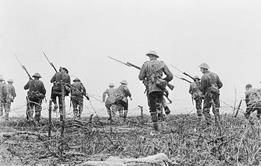The Gazette is fortunate to have a lawyer’s first-hand account of serving in the Great War’s most controversial campaign.
In summer 1915 a new place name began to appear in the Law Society Gazette ’s monthly Roll of Honour.
Alongside Flanders, Ypres or the catch-all ‘France’, paragraphs noted that a solicitor or articled clerk’s death on active service had occurred ‘at the Dardanelles’. Today, that eight-month campaign, the main landings of which occurred 100 years ago this week, is better known as Gallipoli. The doomed attempt at a short-cut to end the war by striking at the heart of the Ottoman Empire remains far and away the most controversial of the conflict.
Russell Crowe’s new film The Water Diviner is only the latest instalment in myth and counter-myth, crucial to the national identities of Australia, New Zealand and the Republic of Turkey. Let alone the reputations of such titans as Mustafa Kemal Ataturk, David Lloyd George and Winston Churchill. Bit players include Clement Attlee and another junior officer, the doomed poet Rupert Brooke.
All these stories will be told and retold on the centenary of the bungled yet heroic landings. The reason to air them here - apart from out of homage to those names in the Roll of Honour - is that the Gazette is privileged to have access to an extraordinarily vivid account in letters and diaries of the campaign, by RCW 'Clive' Burn, admitted in 1912. Extracts, courtesy of his grandson, Oxford employment solicitor Marty Burn, are on our WW1 website.
Some context about the campaign. First, it must be noted that many of the myths are powerful because they contain elements of truth. It really was the case that the lives of half-trained, irreverent yet courageous Anzac volunteers were squandered by incompetence in Whitehall. And that their heroism was then matched by the Ottoman defenders under the brilliant and resourceful Mustapha Kemal (later Ataturk). The Anzac-Turk truce to bury their respective dead did happen, and, transcending religious and cultural barriers, provides one of the most moving stories of the war.
Some popularly perceived truths need tackling, however. First, the Dardanelles landings were not unprovoked aggression: Turkey had joined the German side in the war and opened hostilities against Russia, Britain’s ally, in October 1914.
Meanwhile, despite the songs, movies and emotive remembrances in Australia and New Zealand, the campaign was carried out by a mainly British (and French) force, who suffered twice as many casualties. And of course many of the Anzacs were British-born - including Albert Henry Edginton, who practised as a solicitor at Worcester before emigrating to Australia. He enlisted as a private in August 1914, served in German Papua New Guinea, Egypt and the Dardanelles, where, according to the Law Society’s Record of Service, he ‘died of dysentery and gastritis’ in August 1915.
As for incompetence, on at least two pivotal occasions - the initial naval rush and the later landings at Suvla - hindsight shows the real failing to have been over-caution rather than indifference to casualties. And the eventual evacuation when the battle was lost - in which Lieutenant Burn may have been the last officer on the beach - remains an outstanding military coup.
More seriously, the honourable reputation of ‘Johnny Turk’ and the founding of a new nation from the ruins of the Ottoman Empire must be marred by the Armenian genocide.
But for the moment, we have Burn’s testimony. Typically for his generation, his preoccupation in writing home was to make light of discomforts and minimise the personal peril: a sustained shrapnel barrage is 'very irritating'. A century on, we can read between the lines.
Michael Cross is Gazette news editor. He will be among the speakers at a free event commemorating solicitors’ role in the Great War on 27 April. For details, see here.
Topics
First world war: record of service

To mark the centenary of the first world war, we look at the experiences of solicitors who served on all fronts. Some of these accounts were previously unpublished.













































5 Readers' comments